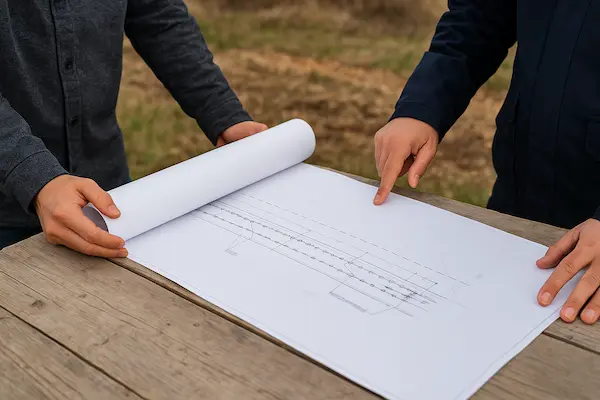
WHY IS A PHASE I ENVIRONMENTAL ASSESSMENT IMPORTANT?
The Phase I Environmental Assessment — also known as a preliminary environmental audit — allows for a standardized investigation into whether a site is associated with environmental liabilities, such as soil contamination, the presence of hazardous substances, or a history of high-impact industrial activities. This investigation is conducted before completing a purchase or investment, and follows the guidelines of the international ASTM E1527 standard.
Suppose someone wishes to acquire a property where a factory previously operated. At first glance, it may seem harmless. However, this assessment may reveal signs of abandoned underground tanks or chemical waste, which could represent future costs for the buyer, including legal implications.
WHAT IS REVIEWED IN A PHASE I ENVIRONMENTAL DUE DILIGENCE?
This is a preliminary and non-intrusive assessment. That is, no drilling, physical sampling, or laboratory analysis is conducted. The focus is on collecting documentary information, visually inspecting the site, and interviewing key individuals.
One of the main objectives is to identify what are known as “recognized environmental conditions,” which are signs that hazardous substances or petroleum products may have affected the site or may still be present. Common indications include stained soils, abandoned wells, affected vegetation, or visible solid waste.
If concerning evidence is found during the inspection, it is recommended to proceed to a Phase II, in which intrusive methods are applied, including soil sampling and specific analyses to confirm or rule out contamination.
LEGAL ADVANTAGES OF PHASE I ENVIRONMENTAL DUE DILIGENCE
This procedure offers multiple advantages. First, it provides transparency regarding the environmental condition of the site, allowing for more informed negotiations and avoidance of future liabilities. Additionally, in many cases, financial institutions and international companies require this type of assessment as a condition for financing or authorizing acquisitions.
In conclusion, conducting a Phase I Environmental Due Diligence is a strategic decision that helps avoid purchasing contaminated land, reduces exposure to legal conflicts, and ensures that any real estate investment is supported by proper technical analysis.
Our law firm offers specialized advisory services in Phase I Environmental Due Diligence, ensuring technical compliance and legal support for your real estate decisions. If you require this service, we invite you to contact us for more information.
Frequently Asked Questions (FAQs)
When is a Phase I Environmental Assessment recommended?
Before buying, selling, or financing land that has had industrial, commercial, or agricultural use.
Is this study mandatory in Bolivia?
It is not mandatory by law, but it is highly recommended as a preventive measure, especially in commercial transactions.
How long does it take to complete the assessment?
Between 2 and 4 weeks, depending on access to information and the location of the property.
What happens if an environmental risk is detected during Phase I?
It is recommended to conduct a Phase II to confirm the presence and extent of the contamination.
The content of this article does not reflect the technical opinion of Rigoberto Paredes & Associates and should not be considered a substitute for legal advice. The information presented herein corresponds to the date of publication and may be outdated at the time of reading. Rigoberto Paredes & Associates assumes no responsibility for keeping the information in this article up to date, as legal regulations may change over time.
- Foreign Companies Operating Primarily in Bolivia
- Establishment of Subsidiaries by Foreign Companies in Bolivia
- CAPITAL REDUCTION IN FOREIGN COMPANIES OPERATING IN BOLIVIA
- JUDICIAL SERVICE TO FOREIGN COMPANIES IN BOLIVIA AND THEIR JOINT LIABILITY
- LEGAL LIABILITY OF REPRESENTATIVES OF FOREIGN COMPANIES IN BOLIVIA




